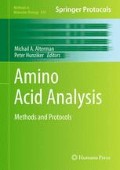Abstract
In this chapter, we describe a method for quantification of 20 proteinogenic amino acids as well as 13 15N-labeled amino acids by liquid chromatography–mass spectrometry without the need for derivatization and use of organic solvents. Analysis of the underivatized amino acids is performed by liquid chromatography–electrospray ionization-tandem mass spectrometry (LC-ESI-MS-MS) in the positive ESI mode. Separation is achieved on a strong cation exchange (SCX) column (Luna 5 μm SCX 100 Å) with 30 mM ammonium acetate in water (A) and 5% acetic acid in water (B). Quantification is accomplished by use of d5-phenylalanine as internal standard achieving limits of detection of 0.1–3.0 μM. The method was successfully applied for the determination of proteinogenic and 15N-labeled amino acids in plant extracts.
Access this chapter
Tax calculation will be finalised at checkout
Purchases are for personal use only
References
Atkins C and Beevers L (1990) Synthesis, transport and utilization of translocated solutes of nitrogen. In: Abroyl, YP (ed) Nitrogen in higher plants, John Wiley and Sons, New York
Guerrero MG, Vega JM and Losada M (1981) The assimilatory nitrate-reducing system and its regulation. Annu Rev Plant Physiol 32:169–204
Miflin BJ and Lea PJ (1977) Amino acid metabolism. Annu Rev Plant Physiol 28:299–329
Hewitt EJ (1975) Assimilatory nitrate-nitrite reduction. Annu Rev Plant Physiol 26:73–100
Fritz C et al (2006) Impact of the C-N status on the amino acid profile in tobacco source leaves. Plant Cell Environ 29:2055–2076
Roth M (1971) Fluorescence reaction for amino acids. Anal Chem 43:880–882
Einarsson S, Josefsson B and Lagerkvist S (1983) Determination of amino acids with 9-fluorenylmethyl chloroformate and reversed-phase high-performance liquid chromatography. J Chromatogr 282:609–618
Blankenship DT et al (1989) High-sensitivity amino acid analysis by derivatization with o-phthalaldehyde and 9-fluorenylmethyl chloroformate using fluorescence detection: Applications in protein structure determination. Anal Biochem 178:227–232
Calder AG et al (1999) Quantitation of blood and plasma amino acids using isotope dilution electron impact gas chromatography/mass spectrometry with U-13C amino acids as internal standards. Rapid Commun Mass Spectrom 13:2080–2083
Wood PL, Khan MA and Moskal JR (2006) Neurochemical analysis of amino acids, polyamines and carboxylic acids: GC-MS quantitation of tBDMS derivatives using ammonia positive chemical ionization. J Chromatogr B 831:313–319
Chace DH (2001) Mass spectrometry in the clinical laboratory. Chem Rev 101:445–478
Husek P and Simek P (2006) Alkyl chloroformates in sample derivatization strategies for GC analysis. Review on a decade use of the reagents as esterifying agents. Curr Pharm Anal 2:23–43
Monton MRN and Soga T (2007) Metabolome analysis by capillary electrophoresis-mass spectrometry. J Chromatogr A 1168:237–246
Soga T et al (2004) Qualitative and quantitative analysis of amino acids by capillary electrophoresis-electrospray ionization-tandem mass spectrometry. Electrophoresis 25:1964–1972
Soga T and Heiger DN (2000) Amino acid analysis by capillary electrophoresis electrospray ionization mass spectrometry. Anal Chem 72:1236–1241
Chaimbault P et al (1999) Determination of 20 underivatized proteinic amino acids by ion-pairing chromatography and pneumatically assisted electrospray mass spectrometry. J Chromatogr A 855:191–202
Petritis K et al (2000) Parameter optimization for the analysis of underivatized protein amino acids by liquid chromatography and ionspray tandem mass spectrometry. J Chromatogr A 896:253–263
Qu J et al (2002) Rapid determination of underivatized pyroglutamic acid, glutamic acid, glutamine and other relevant amino acids in fermentation media by LC-MS-MS. Analyst 127:66–69
Piraud M et al (2005) Ion-pairing reversed-phase liquid chromatography/electrospray ionization mass spectrometric analysis of 76 underivatized amino acids of biological interest: a new tool for the diagnosis of inherited disorders of amino acid metabolism. Rapid Commun Mass Spectrom 19:1587–1602
Armstrong M, Jonscher K and Reisdorph NA (2007) Analysis of 25 underivatized amino acids in human plasma using ion-pairing reversed-phase liquid chromatography/time-of-flight mass spectrometry. Rapid Commun Mass Spectrom 21: 2717–2726
Husek P. and Sweeley CC (1991) Gas chromatographic separation of protein amino acids in 4 minutes. J High Resol Chromatogr 14:751–753
Husek P (1991) Rapid derivatization and gas chromatographic determination of amino acids. J Chromatogr 552:289–299
Bonfiglio R et al (1999) The effects of sample preparation methods on the variability of the electrospray ionization response for model drug compounds. Rapid Commun Mass Spectrom 13:1175–1185
Hsieh Y et al (2001) Quantitative screening and matrix effect studies of drug discovery compounds in monkey plasma using fast-gradient liquid chromatography/tandem mass spectrometry. Rapid Commun Mass Spectrom 15:2481–2487
Alpert AJ (1990) Hydrophilic-interaction chromatography for the separation of peptides, nucleic acids and other polar compounds. J Chromatogr A 499:177–196
Langrock T, Czihal P and Hoffmann R (2006) Amino acid analysis by hydrophilic interaction chromatography coupled on-line to electrospray ionization mass spectrometry. Amino Acids 30:291–297
Schlichtherle-Cerny H, Affolter M and Cerny C (2003) Hydrophilic interaction liquid chromatography coupled to electrospray mass spectrometry of small polar compounds in food analysis. Anal Chem 75:2349–2354
Welch LE et al (1989) Comparison of pulsed coulometric detection and potential-sweep-pulsed coulometric detection for underivatized amino acids in liquid chromatography. Anal Chem 61:555–559
Luo P, Zhang F and Baldwin RP (1991) Constant-potential amperometric detection of underivatized amino acids and peptides at a copper electrode. Anal Chem 63:1702–1707
Thiele B et al (2008) Analysis of amino acids without derivatization in barley extracts by LC-MS-MS. Anal Bioanal Chem 391:2663–2672
Acknowledgments
The authors are grateful to Matthias Gehre (Helmholtz Centre for Environmental Research – UFZ Leipzig, Germany) for providing the 15N-labeled amino acids. We also like to thank Bernd Kastenholz for his assistance in the optimization of the leaf extraction procedure.
Author information
Authors and Affiliations
Corresponding author
Editor information
Editors and Affiliations
Rights and permissions
Copyright information
© 2012 Springer Science+Business Media, LLC
About this protocol
Cite this protocol
Thiele, B., Stein, N., Oldiges, M., Hofmann, D. (2012). Direct Analysis of Underivatized Amino Acids in Plant Extracts by LC-MS-MS. In: Alterman, M., Hunziker, P. (eds) Amino Acid Analysis. Methods in Molecular Biology, vol 828. Humana Press, Totowa, NJ. https://doi.org/10.1007/978-1-61779-445-2_25
Download citation
DOI: https://doi.org/10.1007/978-1-61779-445-2_25
Published:
Publisher Name: Humana Press, Totowa, NJ
Print ISBN: 978-1-61779-444-5
Online ISBN: 978-1-61779-445-2
eBook Packages: Springer Protocols

